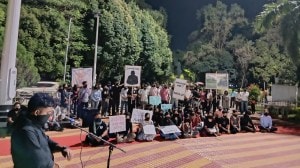Click here to join Express Pune WhatsApp channel and get a curated list of our stories
Preparedness for future respiratory threats; why genomic surveillance, One Health approach matter
Dr Guleria who was awarded the Padma Shri and is Chairman of the Institute of Internal Medicine and Respiratory and Sleep Medicine at Medanta Gurugram was in Pune on Friday.
 Dr Guleria who was awarded the Padma Shri and is Chairman of the Institute of Internal Medicine and Respiratory and Sleep Medicine at Medanta Gurugram was in Pune on Friday. (Express Photo/File)
Dr Guleria who was awarded the Padma Shri and is Chairman of the Institute of Internal Medicine and Respiratory and Sleep Medicine at Medanta Gurugram was in Pune on Friday. (Express Photo/File)
Dr Randeep Guleria former Director, All India Institute of Medical Sciences, New Delhi made a strong case for prioritising genomic surveillance programmes, adopting One Health approach among a slew of other strategies to strengthen preparedness against future respiratory threats.
Dr Guleria who was awarded the Padma Shri and is Chairman of the Institute of Internal Medicine and Respiratory and Sleep Medicine at Medanta Gurugram was in Pune on Friday.
He delivered the keynote address on ‘Healthcare in 2030: Preparing for the Respiratory Revolution’ at the Association of Physicians of India – Armed Forces Medical Services (API-AFMS) ‘Breath by Breath’ national pulmonology conference.
The three day conference has been organised by the Department of Respiratory Medicine, Army Institute of Cardio Thoracic Sciences (AICTS) and was inaugurated by Lt Gen P P Rao, Commandant, Armed Forces Medical College. The conference has drawn more than 150 faculty members and over 500 delegates from across the country.
In his address, Dr Guleria gave a snapshot of how healthcare is one of the sectors that is most exposed to technological evolution. He touched upon various aspects like how respiratory medicine is rapidly evolving with the integration of cutting-edge technologies.
 The conference has drawn more than 150 faculty members and over 500 delegates from across the country. (Express Photo)
The conference has drawn more than 150 faculty members and over 500 delegates from across the country. (Express Photo)
Artificial intelligence (AI) and predictive analytics now enable the analysis of large-scale health datasets to forecast disease outbreaks and identify individuals at high risk of exacerbations—long before symptoms appear.
“Care is moving from one size fits all to personalised treatment. Smart inhalers with sensors, home devices to check lung function and advanced tests like liquid biopsies help doctors optimise treatment plans,” he said.
The expert also spoke about challenges that have to be addressed like rising air pollution, climate change and emerging infections that are contributing to the risk of respiratory threats.
“Every breath is a prayer, every lung a universe- let 2030 be the age of healthy air,” he said while concluding the presentation with a telling image of 2030 vision statement that includes a resilient equitable respiratory care system where precision care, clean air and digital rails reduce exacerbations, accelerating TB elimination and compress time to diagnose everywhere India.
The event brought together leading experts in pulmonary medicines from the Armed Forces and premier academic institutions across the country to discuss advancements and strategies for improving care for patients with respiratory diseases.
Maj Gen P K Sharma, Commandant, AICTS and organising chairperson of the conference also highlighted the AICTS has been a pioneer in respiratory care since its inception in 1948 and emphasised the importance of such gatherings in fostering collaboration and innovation in the field.
Click here to join Express Pune WhatsApp channel and get a curated list of our stories







